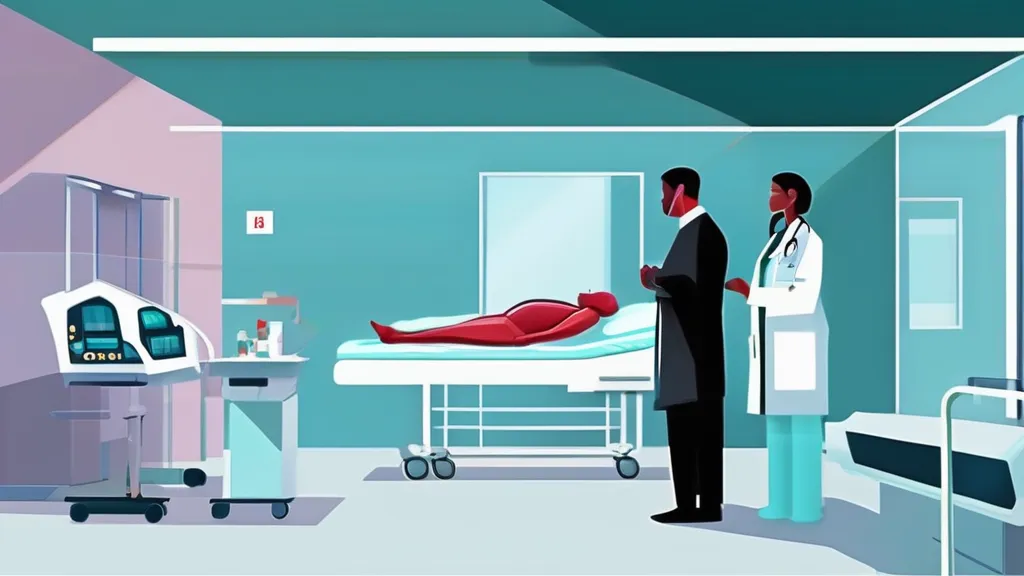The Future of Organ Transplants: A Life Without Anti-Rejection Drugs
Exploring the Breakthroughs That Could Transform Organ Transplantation

- Shawn Wiederhoeft lives medication-free after a kidney transplant.
- University of Wisconsin trial explores immune tolerance techniques.
- Potential to revolutionize organ transplants and reduce medication dependency.
Introduction: A New Era in Organ Transplants
In the heart of Wisconsin, a remarkable story unfolds about family, resilience, and the transformative power of medical innovation. Shawn Wiederhoeft, a video game developer from Madison, leads a life that, at first glance, seems ordinary. However, his health and vitality today are a testament to modern medical breakthroughs that are reshaping the landscape of organ transplants.
For decades, organ transplant recipients have been tethered to a regimen of anti-rejection medications, necessary to prevent the body from attacking the foreign organ. These drugs, while life-saving, come with a host of side effects and complications. But thanks to a pioneering clinical trial at the University of Wisconsin School of Medicine and Public Health, Wiederhoeft lives free from this pharmaceutical dependency.
The Burden of Anti-Rejection Medications
Anti-rejection medications, also known as immunosuppressants, are the cornerstone of post-transplant care. These drugs suppress the immune system to prevent it from recognizing the new organ as a foreign invader. While effective, they increase susceptibility to infections, kidney damage, and even cancer. Moreover, they require a lifelong commitment, with strict adherence to dosing schedules.
The cost is not only physical but financial. According to a 2022 report by the National Kidney Foundation, the average annual cost of immunosuppressive therapy can exceed $10,000. For many, this creates a significant barrier to maintaining health post-transplant.
A Groundbreaking Clinical Trial
Enter the University of Wisconsin’s clinical trial, which offers a beacon of hope for transplant recipients. The trial explores a protocol that could potentially eliminate the need for lifelong anti-rejection medications. Wiederhoeft and his sister, Meagan Hahn, volunteered for this groundbreaking study. Hahn’s healthy kidney was transplanted, and the trial introduced innovative techniques to promote immune tolerance.
Central to this approach is the induction of ’tolerance’, where the recipient’s immune system is trained to accept the transplanted organ as its own. This is achieved through a combination of cellular therapies and temporary immunosuppression during the immediate post-operative period. According to Dr. Dixon Kaufman, head of the transplant surgery division at the University, “This trial represents a paradigm shift in our approach to transplantation. We are moving from managing rejection to promoting acceptance.”
The Mechanisms Behind Immune Tolerance
The science of immune tolerance is as complex as it is promising. By using donor-derived cells infused into the recipient before transplantation, the immune system is reprogrammed to recognize the new organ as part of the body. This process, known as chimerism, is akin to creating a genetic mosaic that diminishes the immune response against the transplanted organ.
A study published in the Journal of Clinical Investigation in 2023 detailed the success of this approach, with over 70% of trial participants living medication-free within two years post-transplant. The implications of such findings are profound, not only reducing the burden of lifelong medication but also significantly improving quality of life.
Real-World Impact: Shawn Wiederhoeft’s Story
For Wiederhoeft, the trial has been life-altering. “I sometimes forget there’s a third kidney in here,” he remarks. “I feel healthier than I’ve ever been.” His experience underscores the potential of this medical advancement to not just save lives, but enhance them.
The trial’s success stories extend beyond Wiederhoeft. Many participants report increased energy levels, improved mental health, and a renewed sense of normalcy. These outcomes challenge the long-held notion that organ transplants necessitate a permanent trade-off between life and health.
Counterpoints and Challenges
While the results are promising, they are not without contention. Critics argue that the long-term effects of immune tolerance are not yet fully understood. Concerns about potential late-onset complications and the scalability of the procedure persist. Furthermore, the cost and complexity of the treatment may limit accessibility, particularly in low-resource settings.
Dr. Ellen Kessler, an immunologist at Stanford University, cautions, “While these advancements are exciting, we must proceed with caution. Long-term data is crucial to understanding the full scope of benefits and risks.”
The Future of Organ Transplants
The implications of these developments extend far beyond individual success stories. If broadly implemented, immune tolerance could revolutionize the field of organ transplantation. By reducing dependency on pharmaceuticals, healthcare systems could see significant cost savings. Moreover, the reduced side effects could decrease the overall burden of care, improving patient outcomes and quality of life.
Looking forward, researchers are optimistic. Ongoing trials are expanding to include other organ types, including liver and heart transplants. The potential to extend immune tolerance across multiple organ systems could mark the dawn of a new era in transplant medicine.
Conclusion: A Paradigm Shift in Medicine
The story of Shawn Wiederhoeft and the University of Wisconsin’s clinical trial is more than a medical success; it is a narrative of hope and innovation that challenges the status quo. As we stand on the brink of a new frontier in transplantation, the potential to transform lives is immense.
The journey is far from over, and questions remain. How will these innovations be integrated into standard practice? What measures can be taken to ensure equitable access? As the field evolves, these questions will guide the path forward.
Call to Action
For those interested in supporting organ transplant research or learning more about how to become a donor, consider reaching out to organizations like the National Kidney Foundation or your local transplant center. Your involvement could help shape the future of transplantation for countless individuals around the world.
References
- National Kidney Foundation: Organ Donation and Transplantation Stats
- Journal of Clinical Investigation: Immune Tolerance Study 2023
- University of Wisconsin School of Medicine and Public Health